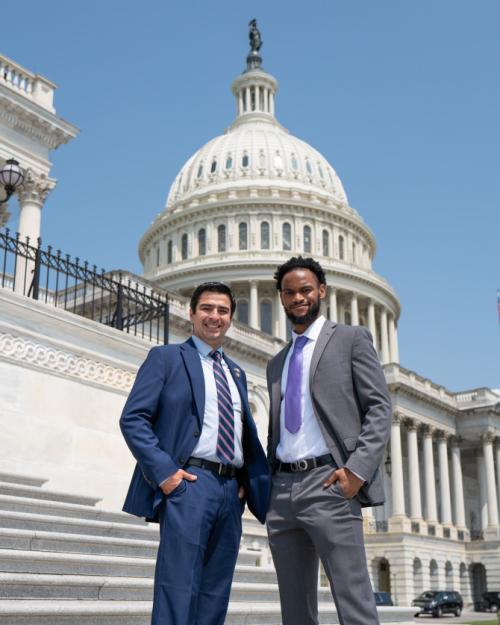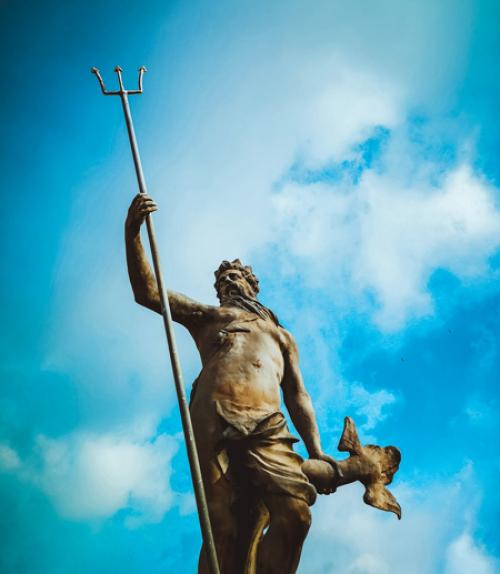This is an episode from the “What Makes Us Human?” podcast's fourth season, "What Does Water Mean for Us Humans?" from Cornell University’s College of Arts & Sciences, showcasing the newest thinking from across the disciplines about the relationship between humans and love. Featuring audio essays written and recorded by Cornell faculty, the series releases a new episode each Tuesday through the spring semester.
Water often weaves itself into ancient Greek poetry and song. A famous ode of the poet Pindar begins “water is best,” a reference, perhaps, to its absolute necessity to life.
In Homer’s Odyssey, the story of the hero’s journey home, the waters of the ocean serve as the main stage. Much of the epic tale takes place on the sea, giving us a glimpse into how ancient Greek civilization understood humanity’s complex relationship with water.
The sea is what separates Odysseus from his home in Ithaca, but it’s also the conduit that can bring him back home again. The poem begins with Odysseus’ son Telemachus about to set sail to find out what happened to his father – for Telemachus, water is a medium for communication, for information, and for truth seeking. Proteus, the Old Man of the Sea, gives voice to the connection between water and knowledge. Much like the ocean, Proteus is shifty and slippery, and he can change his shape at will, into animals and even into water itself. Proteus knows whether Odysseus is still alive and where he’s been all this time. Through Proteus, the ocean gains a communicative voice.
When we first encounter Odysseus, he is deep in a struggle to harness the sea’s energy without being destroyed by it. He has lost all his sailing companions in various misadventures, and he’s building a raft to try to navigate the trip home. We might expect our hero to be the one person who can successfully overcome the ocean and glide victoriously into his home harbor—a quintessential display of humans’ technological dominance over nature. But that’s not what happens at all. Odysseus’ raft gets destroyed in a storm and he almost drowns. As translator Emily Wilson renders it:
"Then for a long time rushing, crashing waves
kept him submerged; he could not reach the surface.
The clothes Calypso gave him weighed him down.
At last he rose and spat the sour saltwater
out of his mouth—it gushed forth in a torrent.”
Although he does manage to swim to shore, the score here is really Water-1, Odysseus-0. In Homer’s poem, though, the game is rigged: the oceans are not just natural water but are magical realms full of divine forces. They contain monsters like Scylla, Charybdis, and the Sirens. And we learn that Poseidon, god of the sea, has been personally thwarting Odysseus’s voyage by roiling up the waters.
It’s dangerous not to respect Poseidon’s power, as we see in Homer’s account of another hero, Ajax, who, as the poem tells us, “made a crazy boast—that he survived the waves against the wishes of the gods. Poseidon heard his rash words…The boundless waves washed over him; he drank the salty brine, and died.”
Odysseus fares pretty well in comparison. He does make it back home. And along the way, the poem has focused us on the tensions and complexities of human experience, rather than any easy heroic triumph over the elements. So water in the poem allows us to explore the complexity of what it means to be human.
Here at Cornell, we invite our own Ithaca community to join Odysseus on his water-filled journey as we read the entire Odyssey in a new English translation, Join us on April 26 from 8 am to 8 pm in Klarman Hall on the Cornell University campus. We will hear this old poem through the diverse voices and faces of today’s Ithaca, amidst ancient statue casts and lunchtime banqueters, with listeners coming and going throughout the day—a modern reimagining of an ancient epic performance.




